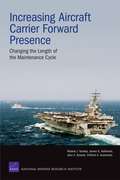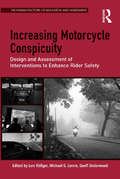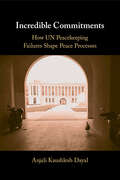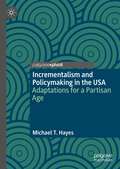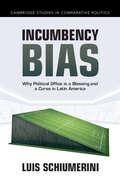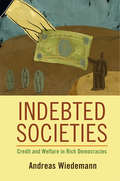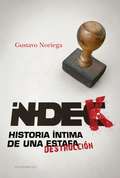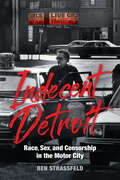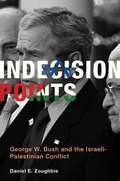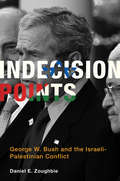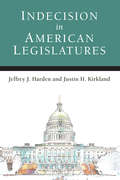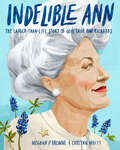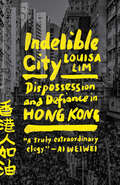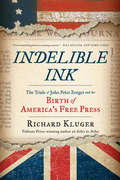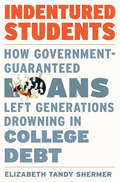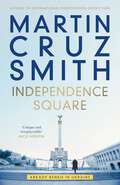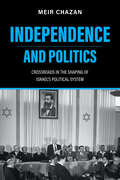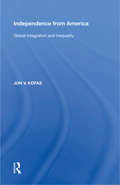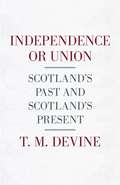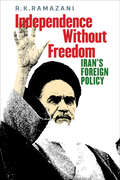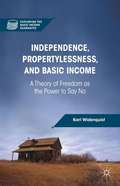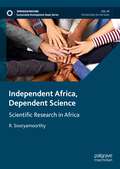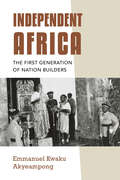- Table View
- List View
Increasing Aircraft Carrier Forward Presence: Changing the Length of the Maintenance Cycle
by Clifford A. Grammich John F. Schank Roland J. Yardley James G. KallimaniThe U.S. Navy's aircraft carrier fleet must meet the forward presence requirements of theater commanders. With a decreasing fleet size, planners must balance the timing of maintenance, training, and deployment with presence and surge demands. Evaluating multiple one- and two-deployment scenarios per cycle, RAND examines the feasibility of different cycle lengths, their effect on carrier forward presence, and their impact on shipyard workloads.
Increasing Motorcycle Conspicuity: Design and Assessment of Interventions to Enhance Rider Safety (Human Factors, Simulation and Performance Assessment)
by Michael G. Lenné Lars RößgerIt’s a widely recognised trend that powered-two-wheelers' (PTWs) use has been steadily increasing and is projected to increase further. While providing benefits to the community in the form of reduced traffic congestion and environmental benefits, the risks to PTW riders remain and visibility will always be a key issue. Increasing Motorcycle Conspicuity aims to illustrate how driving simulation, field studies and laboratory experiments can be used to improve rider safety through the design and evaluation of a range of safety measures. The book outlines the factors that contribute to PTW visibility and detection by car drivers, and presents case studies to illustrate how the various methods can be used to explore the contribution of these factors. The final chapter of the book highlights the utility of a simulation-based approach to improving PTW safety and discusses this method’s future applications. The case studies collected within the volume cover phases of the design of conspicuity treatments and provide a broad spectrum of empirical strategies for assessing the interventions. The book is most directly relevant to researchers and applied scientists from the fields of traffic/transportation psychology and human factors, as well as to practitioners from the traffic safety sector.
Incredible Commitments: How UN Peacekeeping Failures Shape Peace Processes
by Anjali Kaushlesh DayalWhy do warring parties turn to United Nations peacekeeping and peacemaking even when they think it will fail? Dayal asks why UN peacekeeping survived its early catastrophes in Somalia, Rwanda, and the Balkans, and how this survival should make us reconsider how peacekeeping works. She makes two key arguments: first, she argues the UN's central role in peacemaking and peacekeeping worldwide means UN interventions have structural consequences – what the UN does in one conflict can shift the strategies, outcomes, and options available to negotiating parties in other conflicts. Second, drawing on interviews, archival research, and process-traced peace negotiations in Rwanda and Guatemala, Dayal argues warring parties turn to the UN even when they have little faith in peacekeepers' ability to uphold peace agreements – and even little actual interest in peace – because its involvement in negotiation processes provides vital, unique tactical, symbolic, and post-conflict reconstruction benefits only the UN can offer.
Incrementalism and Policymaking in the USA: Adaptations for a Partisan Age
by Michael T. HayesThis book examines incrementalism as a policymaking process in the USA. It provides an overview of incrementalism as a theoretical concept, assesses historical and contemporary attitudes toward it, and considers it as a viable alternative to rationality. The book argues that incrementalism is both an inevitable and desirable method of policymaking, despite seeming ill suited to the current system of highly ideological and polarized political parties. It also advocates a return to realism in which policymakers on both the left and right recognize the superiority of incrementalism, as well as a new system of partisan incrementalism through which political parties compete by offering distinctive incremental alternatives on major policy issues. The book will appeal to scholars and students of American public policy, public administration and politics.
Incumbency Bias: Why Political Office is a Blessing and a Curse in Latin America (Cambridge Studies in Comparative Politics)
by Luis SchiumeriniThe conventional wisdom in political science is that incumbency provides politicians with a massive electoral advantage. This assumption has been challenged by the recent anti-incumbent cycle. When is incumbency a blessing for politicians and when is it a curse? Incumbency Bias offers a unified theory that argues that democratic institutions will make incumbency a blessing or curse by shaping the alignment between citizens' expectations of incumbent performance and incumbents' capacity to deliver. This argument is tested through a comparative investigation of incumbency bias in Brazil, Argentina and Chile that draws on extensive fieldwork and an impressive array of experimental and observational evidence. Incumbency Bias demonstrates that rather than clientelistic or corrupt elites compromising accountability, democracy can generate an uneven playing field if citizens demand good governance but have limited information. While focused on Latin America, this book carries broader lessons for understanding the electoral returns to office around the world.
Indebted Societies: Credit and Welfare in Rich Democracies (Cambridge Studies in Comparative Politics)
by Andreas WiedemannIn many rich democracies, access to financial markets is now a prerequisite for fully participating in labor and housing markets and pursuing educational opportunities. Indebted Societies introduces a new social policy theory of everyday borrowing to examine how the rise of credit as a private alternative to the welfare state creates a new kind of social and economic citizenship. Andreas Wiedemann provides a rich study of income volatility and rising household indebtedness across OECD countries. Weaker social policies and a flexible knowledge economy have increased costs for housing, education, and raising a family - forcing many people into debt. By highlighting how credit markets interact with welfare states, the book helps explain why similar groups of people are more indebted in some countries than others. Moreover, it addresses the fundamental question of whether individuals, states, or markets should be responsible for addressing socio-economic risks and providing social opportunities.
Indec: Historia íntima de una estafa
by Gustavo NoriegaInvestigación periodística acerca de los vaivenes del Indec durante elkirchnerismo. Gustavo Noriega pasó más de quince años trabajando en el InstitutoNacional de Estadística y Censos, procesando datos. Renunció a esetrabajo y se convirtió en un hombre de los medios por su labor en TV,radio y gráfica, pero no pudo evitarregresar al Indec cuando la topadora de Néstor Kirchner y GuillermoMoreno le pasó por encima. Primero, volvió para solidarizarse con sus excompañeros, pero después pasó a la acción, escribió este libro quecuenta de manera extraordinaria todas las implicancias derivadas de lasadulteraciones de los índices de precios y la inflación. El autorsostiene que «dibujar» un número conduce a un verdadero efecto dominó dedesbarajustes y encara su trabajo desde esa lógica: revela cómo y porqué fueron falseados los índices, cómo funcionan las estadísticaspúblicas, qué representa a nivel destructivo la intervención al Indec yexplica que eso solo se pudo lograr ejerciendo violencia contra losnúmeros pero también contra las personas. Como buen amante del cine quees, Noriega cuenta un cuento con héroes, villanos, amores y odios, y unfinal abierto, casi trágico, que es la historia del peor legado de laera K.
Indecent Detroit: Race, Sex, and Censorship in the Motor City
by Ben StrassfeldWhile Detroit has been a major focus in urban history, little has been written on censorship in the very city that—due to shifting legalities, the urban crisis, and racial tensions—profoundly shaped media suppression in the United States. By examining censorship in film and literature, Indecent Detroit recounts the evolution of media control from the end of WWII through the 1970s, when the US saw a major change in the legal mechanisms used to censor media due to court rulings that curtailed censorship laws. Ben Strassfeld reveals how Detroit altered its censorial tactics and rhetoric from an obscenity-based system of censorship centered in the Detroit Police Department to a regulatory model based in zoning law that was then expanded nationwide. This shift was connected to broader social and political trends, including the sexual revolution, that led the public to increasingly turn against censorship. A must-read for film and media scholars, Indecent Detroit highlights how one Midwest city's ordinance was imitated across the country after it was upheld by the US Supreme Court, making this more than a local curiosity but also an influential model for the cultural, political, and moral control of urban space through media regulation.
Indecision Points
by Daniel E. ZoughbieAlthough George W. Bush memorably declared, "I'm the decider," as president he was remarkably indecisive when it came to U.S. policy toward the Israeli-Palestinian conflict. His administration's policymaking featured an ongoing clash between moderate realists and conservative hard-liners inspired by right-wing religious ideas and a vision of democracy as cure-all. Riven by these competing agendas, the Bush administration vacillated between recognizing the Palestinian right to self-determination and embracing Israeli leaders who often chose war over negotiations. Through the years, the administration erratically adopted and discarded successive approaches to the Israeli-Palestinian peace process. The results of this irresolution included the stunning triumph of Hamas in the 2006 Palestinian elections, Israel's 2006 invasion of Lebanon, the 2008--2009 clash between Israel and Hamas in Gaza, and, in the end, virtually no diplomatic progress toward lasting peace. In Indecision Points, Daniel Zoughbie examines the major assumptions underpinning U.S. foreign policy in the Middle East during the Bush years. Was there one policy or two? Was the Bush administration truly serious about peace? In a compelling account, Zoughbie offers original insights into these and other important questions. Drawing on the auhtor's own interviews with forty-five global leaders, including Condoleezza Rice, former Archbishop of Canterbury Rowan Williams, Kofi Annan, Colin Powell, Tom DeLay, Paul Wolfowitz, Douglas Feith, Richard Perle, Leon Panetta, Chuck Hagel, Shlomo Ben Ami, and Salam Fayyad, Indecision Points provides the first comprehensive history of the Bush administration's attempt to reshape political order in a "New Middle East."
Indecision Points: George W. Bush and the Israeli-Palestinian Conflict (Belfer Center Studies in International Security)
by Daniel E. ZoughbieHow a president who prided himself on his decisiveness vacillated between policy approaches in the Middle East. Although George W. Bush memorably declared, “I'm the decider,” as president he was remarkably indecisive when it came to U.S. policy toward the Israeli-Palestinian conflict. His administration's policymaking featured an ongoing clash between moderate realists and conservative hard-liners inspired by right-wing religious ideas and a vision of democracy as cure-all. Riven by these competing agendas, the Bush administration vacillated between recognizing the Palestinian right to self-determination and embracing Israeli leaders who often chose war over negotiations. Through the years, the administration erratically adopted and discarded successive approaches to the Israeli-Palestinian peace process. The results of this irresolution included the stunning triumph of Hamas in the 2006 Palestinian elections, Israel's 2006 invasion of Lebanon, the 2008–2009 clash between Israel and Hamas in Gaza, and, in the end, virtually no diplomatic progress toward lasting peace. In Indecision Points, Daniel Zoughbie examines the major assumptions underpinning U.S. foreign policy in the Middle East during the Bush years. Was there one policy or two? Was the Bush administration truly serious about peace? In a compelling account, Zoughbie offers original insights into these and other important questions. Drawing on the auhtor's own interviews with forty-five global leaders, including Condoleezza Rice, former Archbishop of Canterbury Rowan Williams, Kofi Annan, Colin Powell, Tom DeLay, Paul Wolfowitz, Douglas Feith, Richard Perle, Leon Panetta, Chuck Hagel, Shlomo Ben Ami, and Salam Fayyad, Indecision Points provides the first comprehensive history of the Bush administration's attempt to reshape political order in a “New Middle East.”
Indecision in American Legislatures (Legislative Politics And Policy Making)
by Jeffrey J. Harden Justin H. KirklandLawmaking provides many opportunities for proposals to be altered, amended, tabled, or stopped completely. The ideal legislator should assess evidence, update his or her beliefs with new information, and sometimes be willing to change course. In practice, however, lawmakers face criticism from the media, the public, and their colleagues for “flip-flopping.” Legislators may also only appear to change positions in some cases as a means of voting strategically. This book presents a systematic examination of legislative indecision in American politics. This might occur via “waffling”—where a legislator cosponsors a bill, then votes against it at roll call. Or it might occur when a legislator votes one way on a bill, then switches her vote to the other side. In Indecision in American Legislatures, Jeffrey J. Harden and Justin H. Kirkland develop a theoretical framework to explain indecision itself, as well as the public’s attitudes toward indecision. They test their expectations with data sources from American state legislatures, the U.S. Congress, and survey questions administered to American citizens. Understanding legislative indecision from both the legislator and citizen perspectives is important for discussions about the quality of representation in American politics.
Indefensible Space: The Architecture of the National Insecurity State
by Edited by MICHAEL SORKINShowing how the upswell of paranoia and growing demand for security in the post-9/11 world has paradoxically created widespread insecurity, these varied essays examine how this anxiety-laden mindset erodes spaces both architectural and personal, encroaching on all aspects of everyday life. Starting from the most literal level—barricades and barriers in front of buildings, beefed up border patrols, gated communities, "safe rooms,"—to more abstract levels—enhanced surveillance at public spaces such as airports, increasing worries about contagion, the psychological predilection for fortified space—the contributors cover the full gamut of securitized public life that is defining the zeitgeist of twenty-first century America
Indelible Ann: The Larger-Than-Life Story of Governor Ann Richards
by Meghan P. BrowneA folksy, larger-than-life picture book biography about Ann Richards, the late governor of Texas who has inspired countless women in politics today.Dorothy Ann Willis hailed from a small Texas town, but early on she found her voice and the guts to use it. During her childhood in San Diego and her high school years back in Texas (when she dropped the "Dorothy"), Ann discovered a spark and passion for civic duty. It led her all the way to Washington, DC, where she, along with other girls from around the country, learned about the business of politics. Fast forward to Ann taking on the political boys' club: she became county commissioner, then state treasurer, and finally governor of Texas. In this stunning picture book biography, full of vim, vigor, and folksy charm, two Texan creators take us through the life of the legendary "big mouth, big hair" governor of Texas, a woman who was inspired by Eleanor Roosevelt, and in turn became an inspiration to Hillary Clinton and countless others.
Indelible City: Dispossession and Defiance in Hong Kong
by Louisa LimAn award-winning journalist and longtime Hong Konger indelibly captures the place, its people, and the untold history they are claiming, just as it is being erased.The story of Hong Kong has long been dominated by competing myths: to Britain, a &“barren rock&” with no appreciable history; to China, a part of Chinese soil from time immemorial, at last returned to the ancestral fold. For decades, Hong Kong&’s history was simply not taught, especially to Hong Kongers, obscuring its origins as a place of refuge and rebellion. When protests erupted in 2019 and were met with escalating suppression from Beijing, Louisa Lim—raised in Hong Kong as a half-Chinese, half-English child, and now a reporter who has covered the region for nearly two decades—realized that she was uniquely positioned to unearth the city&’s untold stories. Lim&’s deeply researched and personal account casts startling new light on key moments: the British takeover in 1842, the negotiations over the 1997 return to China, and the future Beijing seeks to impose. Indelible City features guerrilla calligraphers, amateur historians and archaeologists, and others who, like Lim, aim to put Hong Kongers at the center of their own story. Wending through it all is the King of Kowloon, whose iconic street art both embodied and inspired the identity of Hong Kong—a site of disappearance and reappearance, power and powerlessness, loss and reclamation.
Indelible Ink: The Trials of John Peter Zenger and the Birth of America
by Richard KlugerThe untold story of the battle to legalize free expression in America by the Pulitzer Prize-winning author of Ashes to Ashes. The liberty of written and spoken expression has been fixed in the firmament of our social values since our nation's beginning--the government of the United States was the first to legalize free speech and a free press as fundamental rights. But when the British began colonizing the New World, strict censorship was the iron rule of the realm; any words, true or false, that were thought to disparage the government were judged a criminally subversive--and duly punishable--threat to law and order. Even after Parliament lifted press censorship late in the seventeenth century, printers published what they wished at their peril. So when in 1733 a small newspaper, the New-York Weekly Journal, printed scathing articles assailing the new British governor, William Cosby, as corrupt and abusive, colonial New York was scandalized. The paper's publisher, an impoverished printer named John Peter Zenger with a wife and six children, in fact had no hand in the paper's vitriolic editorial content--he was only a front man for Cosby's adversaries, New York Supreme Court Chief Justice Lewis Morris and the shrewd attorney James Alexander. Zenger nevertheless became the endeavor's courageous fall guy when Cosby brought the full force of his high office down upon it. Jailed for the better part of a year, Zenger faced a jury on August 4, 1735, in a proceeding matched in importance during the colonial period only by the Salem Witch Trials. In Indelible Ink, acclaimed social historian Richard Kluger re-creates in rich detail this dramatic clash of powerful antagonists that marked the beginning of press freedom in America and its role in vanquishing colonial tyranny. Here is an enduring lesson that resounds to this day on the vital importance of free public expression as the underpinning of democracy.
Indentured Students: How Government-Guaranteed Loans Left Generations Drowning in College Debt
by Elizabeth Tandy ShermerThe untold history of how America’s student-loan program turned the pursuit of higher education into a pathway to poverty. It didn’t always take thirty years to pay off the cost of a bachelor’s degree. Elizabeth Tandy Shermer untangles the history that brought us here and discovers that the story of skyrocketing college debt is not merely one of good intentions gone wrong. In fact, the federal student loan program was never supposed to make college affordable. The earliest federal proposals for college affordability sought to replace tuition with taxpayer funding of institutions. But Southern whites feared that lower costs would undermine segregation, Catholic colleges objected to state support of secular institutions, professors worried that federal dollars would come with regulations hindering academic freedom, and elite-university presidents recoiled at the idea of mass higher education. Cold War congressional fights eventually made access more important than affordability. Rather than freeing colleges from their dependence on tuition, the government created a loan instrument that made college accessible in the short term but even costlier in the long term by charging an interest penalty only to needy students. In the mid-1960s, as bankers wavered over the prospect of uncollected debt, Congress backstopped the loans, provoking runaway inflation in college tuition and resulting in immense lender profits. Today 45 million Americans owe more than $1.5 trillion in college debt, with the burdens falling disproportionately on borrowers of color, particularly women. Reformers, meanwhile, have been frustrated by colleges and lenders too rich and powerful to contain. Indentured Students makes clear that these are not unforeseen consequences. The federal student loan system is working as designed.
Independence Square: Arkady Renko in Ukraine (The\arkady Renko Novels Ser. #10)
by Martin Cruz SmithPRE-ORDER THE BRAND NEW NOVEL FROM MARTIN CRUZ SMITH, COMING 2025!&‘The later Renko novels are stark, spare and beautiful, like trees in winter. Martin Cruz Smith does more on a page than most writers manage in a chapter. He is unique and irreplaceable&’ MICK HERRON ARKADY RENKO IS BACK . . . Renko has been confined to a desk job by his superiors to keep him out of the way. Although he&’s more disillusioned with policing and the general state of Russia than ever, he feels an odd sense of hope. A rebellion is bubbling in the country, with new values butting heads against old-school regimes. People want change and politician Leonid Lebedev could be the man to do it. When Karina, a staunch supporter of Lebedev and member of the Forum, goes missing, Renko is asked by her father to find her. Soon after his investigation begins, Alex, a close friend of Arkady&’s son, is found dead. He was also a member of the Forum. The night before his murder, Alex sent Arkady a cryptic message, simply containing three pictures of Russian writers. The link between the pictures is there, if only Renko could see it. But Arkady has just been diagnosed with Parkinson&’s and the physical and psychological effects of the disease are taking their toll. This time, he must fight more than the impenetrable Russian regime to get answers – he will need to fight himself. PRAISE FOR MARTIN CRUZ SMITH: &‘Smith was among the first of a new generation of writers who made thrillers literary&’ Guardian &‘One of those writers that anyone who is serious about their craft views with respect bordering on awe&’ Val McDermid &‘Martin Cruz Smith writes with an immediacy, depth and lightness of touch that is rare in its combination, and impossible to resist . . . Independence Square is no exception, and further crystallises Cruz Smith as one of the finest writers of our age&’ Charlotte Philby &‘The undisputed master of the political crime thriller&’ Abir Mukherjee 'A moving portrayal of struggle against political and personal tides' New York Times 'Renko started off investigating murders in Soviet Russia, now it's political corruption in Putin's Russia. And it's even more gripping than before' Gareth Rubin &‘Cruz Smith&’s most powerful and engaging novel since Gorky Park&’ Paul Burke, CrimeTime FM
Independence and Politics: Crossroads in the Shaping of Israel's Political System (Perspectives on Israel Studies)
by Meir ChazanIndependence and Politics delves deeply into the political landscape of Israel during the years 1947–1949. Weaving together a wealth of original sources and emphasizing domestic politics, Meir Chazan offers a comprehensive analysis of the critical factors that contributed to the establishment and early governance of the State of Israel.Chazan explores the formation of governing institutions in the transition from a voluntary society to typical patterns of statehood. He investigates the shocks that led to these institutions' formation and the critical decision to declare statehood. Additionally, he provides a detailed account of the election campaign for the Constituent Assembly, which was the forerunner of the First Knesset, and the struggle to attain the United States' de facto and de jure recognition of Israel.Insightful and informative, Independence and Politics provides a fresh perspective on the establishment of the State of Israel. Chazan's analysis and expert commentary offer an unparalleled understanding of the challenges faced by the fledgling state and the decisions that shaped its future.
Independence from America: Global Integration and Inequality
by Jon V. KofasJon Kofas offers a comprehensive and thought-provoking study of 'global integration' after the Second World War. Globalization is perceived to be essentially the process of world economic integration in which the United States has played the key role but in which interests of most Third World countries have been sacrificed. This study's original contribution lies in the author's contention that there have been two 'models' of globalization: the US led 'patron-client model' and the EU initiated 'interdependent integral model'. It will be of particular interest to those studying and researching in the fields of international political economy, foreign policy, development politics, political theory and sociology of development.
Independence of the Scottish Mind
by Gerry HassanThis study explores modern Scotland and examines how Scottish politics, culture and identities have interacted within the national and international contexts in the last 30 years. It considers which voices and opinions have proven influential and defining, and it charts the boundaries of public conversation to and beyond the independence referendum. This book locates contemporary debates on Scottish self-government in an analysis of the long term historic development of Scottish autonomy and difference. Based on extensive interviews with leading members of the Scottish political commentariat, it applies the idea of "elite narratives" to articulate how ideas and debate can slowly shift and frame public opinion. It draws on ideas of the construction of the near-past, folklore, collective memories, power, voice and space, to bring together an original contribution to politics, media and the dynamics of public debate.
Independence or Union: Scotland's Past and Scotland's Present
by T. M. DevineThere can be no relationship in Europe's history more creative, significant, vexed and uneasy than that between Scotland and England. From the Middle Ages onwards the island of Britain has been shaped by the unique dynamic between Edinburgh and London, exchanging inhabitants, monarchs, money and ideas, sometimes in a spirit of friendship and at others in a spirit of murderous dislike.Tom Devine's seminal new book explores this extraordinary history in all its ambiguity, from the seventeenth century to the present. When not undermining each other with invading armies, both Scotland and England have broadly benefitted from each other's presence - indeed for long periods of time nobody questioned the union which joined them. But as Devine makes clear, it has for the most part been a relationship based on consent, not force, on mutual advantage, rather than antagonism - and it has always held the possibility of a political parting of the ways.With the United Kingdom under a level of scrutiny unmatched since the eighteenth century Independence or Union is the essential guide.
Independence without Freedom: Iran's Foreign Policy
by R. K. RamazaniRuhi Ramazani is widely considered the dean of Iranian foreign policy study, having spent the past sixty years studying and writing about the country's international relations. In Independence without Freedom, Ramazani draws together twenty of his most insightful and important articles and book chapters, with a new introduction and afterword, which taken together offer compelling evidence that the United States and Iran will not go to war.The volume’s introduction outlines the origins of Ramazani’s early interest in Iran’s international role, which can be traced to the crushing effects of World War II on the country and Iran’s historic decision to free its oil industry from the British Empire. In the afterword, he discusses the reasons behind America’s poor understanding of Iranian foreign policy, articulates the fundamentals of his own approach to the study of Iran—including the nuclear dispute—and describes the major instruments behind Iran’s foreign efforts. Independence without Freedom will serve as a crucial resource for anyone interested in the factors and forces that drive Iranian behavior in world politics.
Independence, Propertylessness, And Basic Income
by Karl WiderquistIndependence, Propertylessness, and Basic Income argues that philosophers have focused too much on scalar freedom and proposes a theory of status freedom as effective control self-ownership: the power to have or refuse active cooperation with other willing people, or simply: freedom as the power to say no.
Independent Africa, Dependent Science: Scientific Research in Africa (Sustainable Development Goals Series)
by R. SooryamoorthyThis book offers an examination of Africa’s scientific landscape based on extensive empirical data encompassing fifty-four African countries. It traces the evolution of science on the continent, highlighting research areas, global partnerships, funding sources, research capacity, and the impact of science policies. Acknowledging that Africa relies heavily on external sources, particularly from the Global North, for scientific research, the book identifies and addresses obstacles hindering self-reliance and underscores the urgent need for revitalized partnerships and cooperation to bolster Africa's scientific autonomy. It offers valuable recommendations to promote self-reliance, making it an indispensable resource for scholars, policymakers, and practitioners.
Independent Africa: The First Generation of Nation Builders
by Emmanuel Kwaku AkyeampongIndependent Africa explores Africa's political economy in the first two full decades of independence through the joint projects of nation-building, economic development, and international relations.Drawing on the political careers of four heads of states: Kwame Nkrumah of Ghana, Ahmed Sékou Touré of Guinea, Léopold Sédar Senghor, and Julius Kambarage Nyerere of Tanzania, Independent Africa engages four major themes: what does it mean to construct an African nation-state and what should an African nation-state look like; how does one grow a tropical economy emerging from European colonialism; how to explore an indigenous model of economic development, a "third way," in the context of a Cold War that had divided the world into two camps; and how to leverage internal resources and external opportunities to diversify agricultural economies and industrialize.Combining aspects of history, economics, and political science, Independent Africa examines the important connections between the first generation of African leaders, and the shared ideas that informed their endeavors at nation-building and worldmaking.
